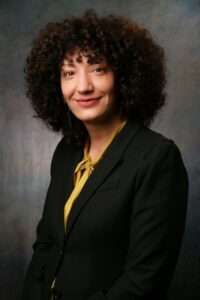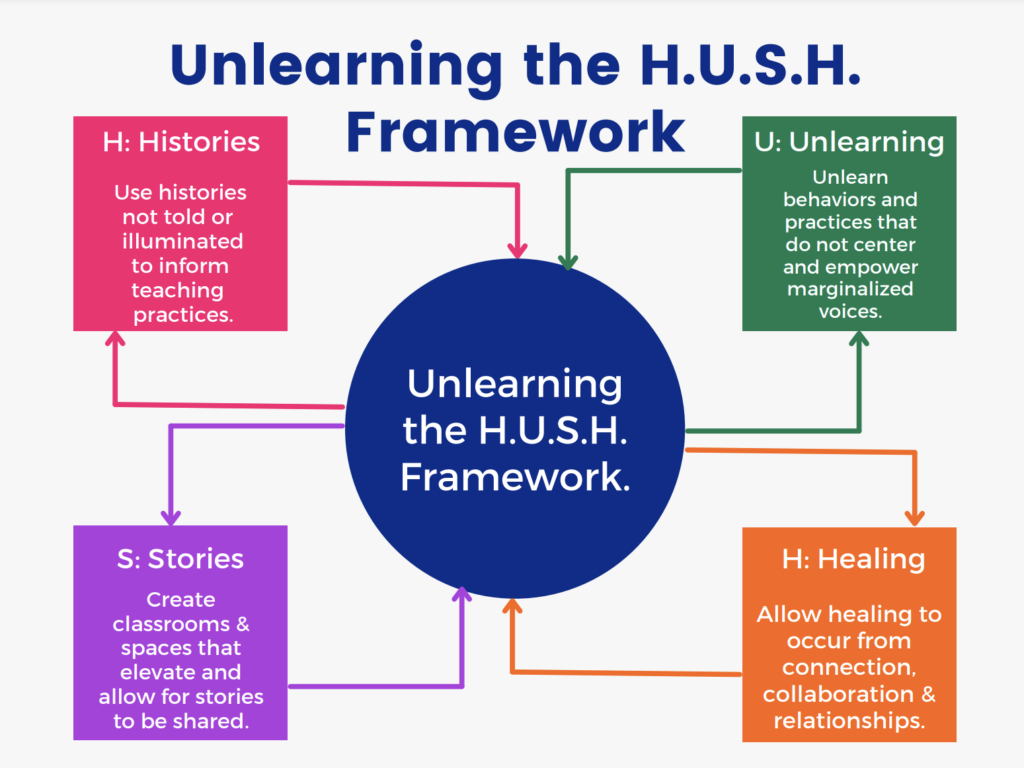This post was written by NCTE member Dr. Marlee Bunch.
In 2022, our schools and classrooms are faced with a myriad of issues that impact students: debate about text choice, post-pandemic struggles, controversy about social-emotional learning and critical race theory, mental health concerns faced by young people, and many others. As our students and learners evolve, and as the world and classrooms continue to diversify, how can we ensure that pedagogy and teaching practices continue to open doors for learners to engage with inclusive content?
The Unlearning the HUSH Framework Rationale
As an educator, I have been exposed to many tools and techniques for creating lessons and content that served all students. The truth is, most of those tools and techniques did a poor job of considering all learners, and they often failed to create inclusive content. The Unlearning the HUSH Framework was born out of the histories and stories collected around my research about Black female educators in Mississippi pre– and post–Brown v. Board and my own teaching experiences and educational training. My teaching experiences and training have afforded me the opportunity to work with all learners: gifted students, ELLs (English Language Learners), students deemed high risk, adult education learners, postsecondary students, students from suburban schools, students from Title I schools, and so forth. The Framework is the culmination of effective strategies and research that intersected to consider the best practices we as educators can implement if we seek to create classrooms that teach and celebrate diverse voices and histories.
The Unlearning the HUSH Framework Introduced and Explained
The HUSH Framework can be applied to any lesson plan or teaching content at the K–12 or postsecondary level. This framework is a guide and accountability piece to create inclusive learning content that supports all students. The framework considers both student and educator and requires mindful and consistent engagement from the educator. Combining these four elements offers an important blueprint to hold us accountable for creating content and spaces that engage and honor all twenty-first-century learners, specifically those from historically marginalized communities. Just as the North Star serves as a reliable guide, the HUSH Framework provides an internal compass for guiding our lessons and activities in the classroom while also challenging us to reflect about our teaching practices and ideologies.
The Four Core Concepts of the Framework
- Histories
- Unlearning
- Stories
- Healing
Histories should offer learning about communities and marginalized groups that are often left out of the discourse. Consider what you wish you had learned earlier in school or life. What are some historical elements or figures that are not widely known but have been formative in shaping our world? Any state standards can be made to fit easily under this umbrella of historical or societal content.
Unlearning is the next component, which requires two critical elements: your own self-reflection and the creation of self-reflection questions to engage and demonstrate to students the importance of consistent unlearning, consideration of perspectives, and analysis of ideas and content. Knowing our own positionality helps us become better educators and allows us to engage in the learning process with students in an authentic and purposeful manner.
Stories form the connective element that helps bridge relationships with students and allows them to connect with each other. This element will allow content to become more relevant and help move the learning from rote memorization to engagement and understanding. Allowing stories to exist in our learning spaces creates connections from past to present, allows student voice and autonomy to exist, and can create safe spaces for students to inquire and connect.
To create change, we must find collective healing. This process includes additional reflection, celebrating diverse people and voices, and using dialogue to process content and how it impacts us. Healing offers opportunities to share stories and perspectives that connect to our learning and the commitment to embrace pedagogical practices that support students’ social and emotional well-being.
These four concepts can be used to create spaces that usher in inclusive practices and behaviors. As educators, we have the ability to disrupt systemic inequities by modeling and employing practices that teach our future generations to consider perspectives, feel validated in their own identities, forge connections through stories, and self-reflect throughout the learning process—all of which work together to liberate classrooms from centering only homogenous voices. Find additional resources tied to the framework here.
 Marlee Bunch is an educator with over 16 years of teaching experience. She holds a doctoral degree from the University of Illinois and two other graduate degrees. She holds a teaching certificate, gifted education certification, a Diversity and Equity certificate, and an ESL (English as a Second Language) certification. Her experiences in teaching at the secondary and postsecondary levels have allowed her to write curriculum, mentor teachers, create workshops, tutor, advocate for inclusion, and, most important, mentor students. Her research, teaching, and educational advocacy work seek to disrupt inequities, advocate for educational reform, and illuminate the power of storytelling and history. Her research focuses on the oral histories of Black female educators and communities. She has been featured on several podcasts and recently co-created a gallery exhibit related to her research. You can visit this work at Supporting Students in Their Journeys of Healing, co-recorded with Brittany Collins for the Phenomenal Teaching Podcast (PEBC), and also at this post from Inside Columbia. Connect on her website at marleebunch.com.
Marlee Bunch is an educator with over 16 years of teaching experience. She holds a doctoral degree from the University of Illinois and two other graduate degrees. She holds a teaching certificate, gifted education certification, a Diversity and Equity certificate, and an ESL (English as a Second Language) certification. Her experiences in teaching at the secondary and postsecondary levels have allowed her to write curriculum, mentor teachers, create workshops, tutor, advocate for inclusion, and, most important, mentor students. Her research, teaching, and educational advocacy work seek to disrupt inequities, advocate for educational reform, and illuminate the power of storytelling and history. Her research focuses on the oral histories of Black female educators and communities. She has been featured on several podcasts and recently co-created a gallery exhibit related to her research. You can visit this work at Supporting Students in Their Journeys of Healing, co-recorded with Brittany Collins for the Phenomenal Teaching Podcast (PEBC), and also at this post from Inside Columbia. Connect on her website at marleebunch.com.
It is the policy of NCTE in all publications, including the Literacy & NCTE blog, to provide a forum for the open discussion of ideas concerning the content and the teaching of English and the language arts. Publicity accorded to any particular point of view does not imply endorsement by the Executive Committee, the Board of Directors, the staff, or the membership at large, except in announcements of policy, where such endorsement is clearly specified.

